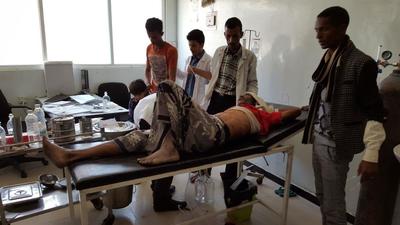Médecins Sans Frontières/Doctors Without Borders (MSF) psychologist Melanie Kerloc’h describes the effects of unremitting violence on ordinary Palestinians living in the occupied West Bank.
“I'm scared. I don't want them to come tonight even if I know it's just to scare us. I don't want them to arrest my father,” says a Palestinian girl living in the West Bank.
Occupied by Israel since 1967, the West Bank has seen more than its share of violence over the years.
Constant violence
“The violence is constant,” says MSF psychologist Melanie Kerloc’h.
“It is unrelenting and insidious. For Palestinians in the West Bank, it’s like having a sword of Damocles hanging over your head, not knowing when it’s going to strike.”
The violence in the West Bank stepped up a gear in recent weeks as the Israeli army carried out search operations, raids and arrests following the kidnap of three Israeli settlers on 12th June.
It is at night-time that families are most vulnerable, says Melanie, when they let down their guard and go to sleep.
The sudden intrusion of soldiers into one’s home in the middle of the night – into the private, family sphere which is supposed to be a refuge – can be psychologically traumatising.
“Attacks by settlers on Palestinians and their homes are also much more terrifying at night, as people feel trapped,” says Melanie.
Children at risk
Children and teenagers are particularly at risk. “The impact of repeated break-ins on developing minds is very worrying,” says Mélanie.
“Parents who are stressed and feeling overwhelmed by circumstances are often unable to help their children build up the 'protective shield' necessary to protect themselves mentally.”
Some parents also find themselves forced to watch, powerless, as their children are arrested by Israeli forces. ”Seeing your 14-year-old son arbitrarily arrested without being able to object is harrowing and humiliating,” says Melanie.
“It robs parents of their protective function.” In the West Bank, a Palestinian child can be arrested and imprisoned from the age of 12, according to UNICEF.
Between the disappearance of three young Israeli settlers on 12th June and the discovery of their bodies on 30th June, the Israeli army conducted large-scale search operations across the West Bank and made more than 900 arrests, according to media reports.
One of those arrested was a 14-year-old boy. The previous week, his home had been raided and ransacked by Israeli soldiers.
After his arrest, he was taken to a detention cell and beaten throughout the night. “This is how individuals are ground down by the violence of the system,” says Melanie.
“Minds eaten by violence”
Melanie’s patients tell her that Israeli settlers or soldiers sometimes burst into Palestinian schools and subject the children to verbal abuse, speaking to the children as if they were enemies of their own size.
“Children who are subjected to this type of attack describe feeling both intense fear and intense mental excitement,” says Melanie.
“They are overwhelmed by emotions they are not yet able to control. How can they develop when they have to cope with this? Their minds are eaten away by violence.”
In the West Bank, collective punishment is widely used by Israeli forces. Being punished when you are innocent has a particularly destabilising effect on people, says Melanie.
One family had their home raided a number of times by the military after one of their sons had been sentenced to prison. “They were told, ‘You must also be punished for the crime committed by your son.’
“Justice should be a means of settling cases without recourse to retaliation. Yet here, justice is about an eye for an eye, a tooth for a tooth.”
Growing up in these circumstances makes it practically impossible for young Palestinians to make concrete plans for the future.
“Young people are living with no prospects,” says Melanie, “and the question of what the future holds is dizzying and causes them terrible anxiety.”
Find out more about MSF’s work in
the Occupied Palestinian Territories





